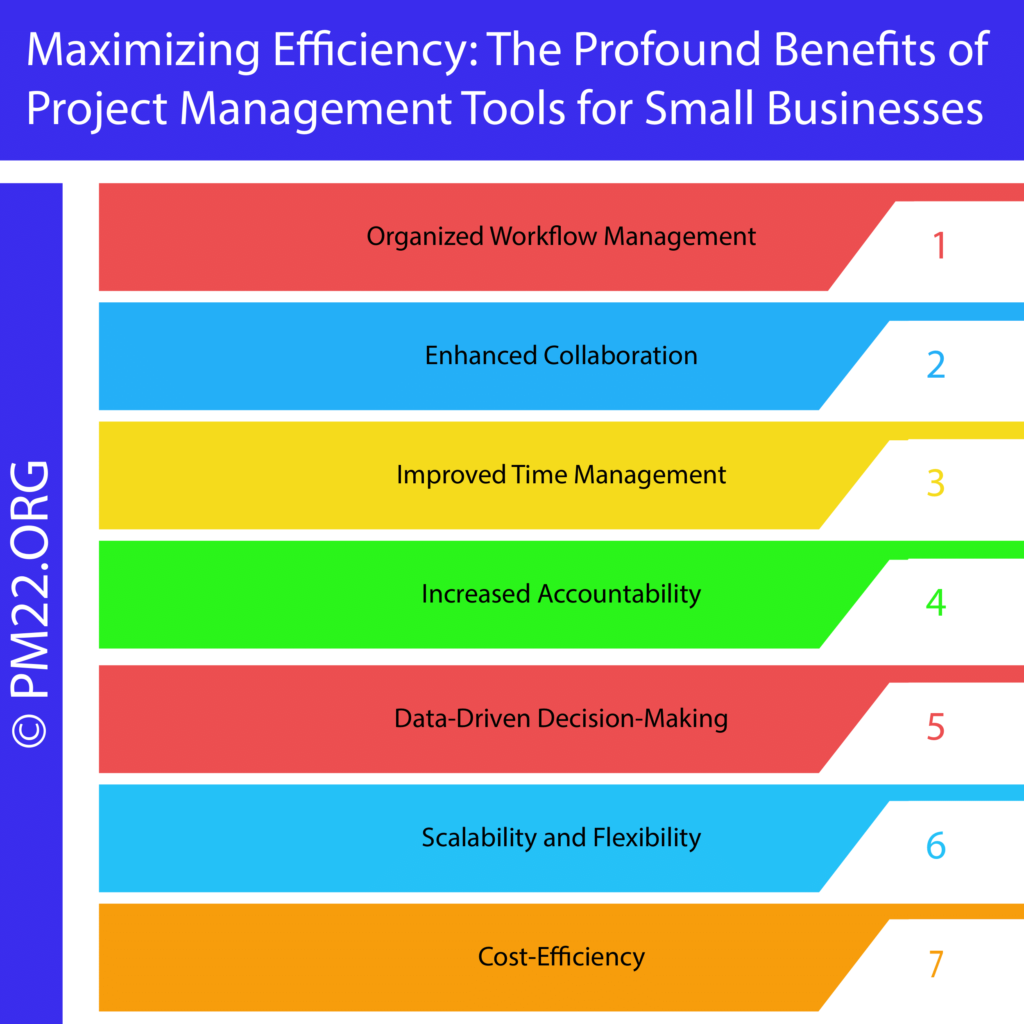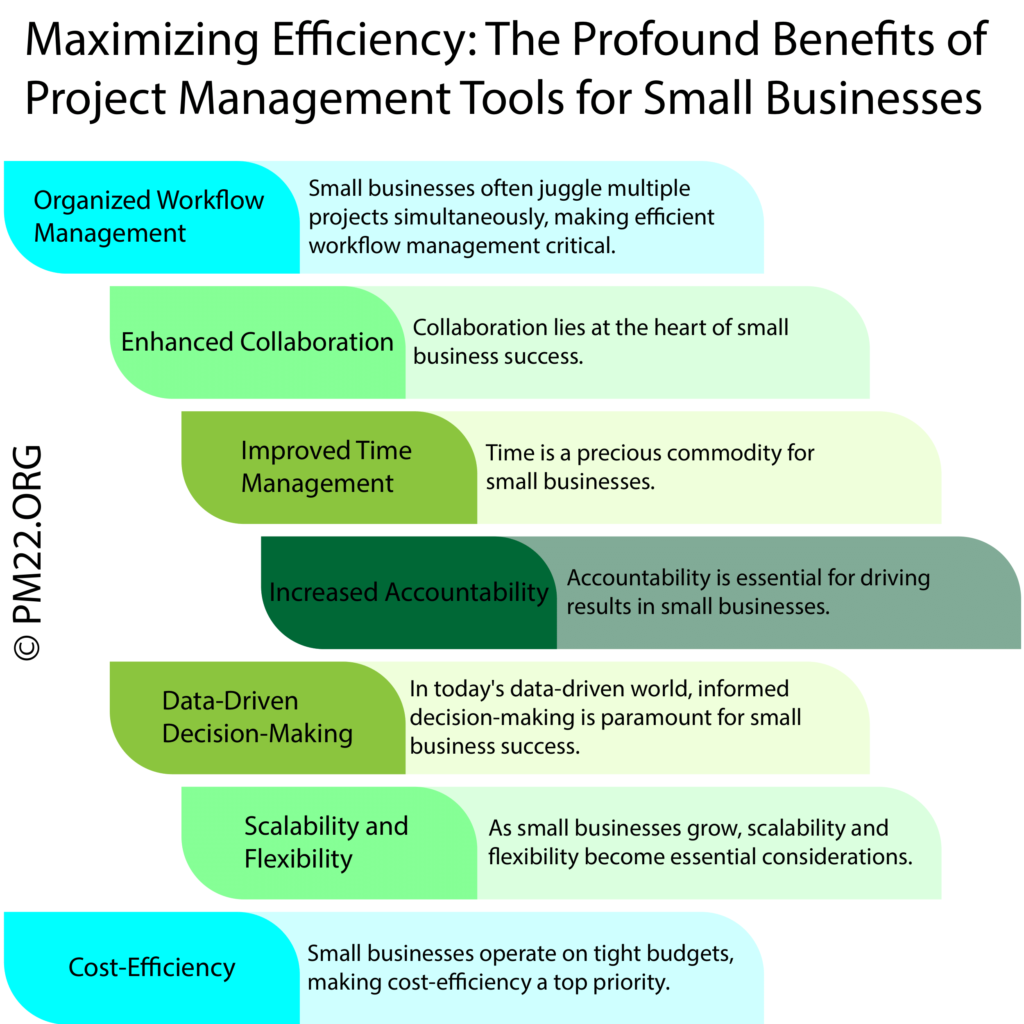 In the dynamic landscape of small businesses, where every resource counts and efficiency reigns supreme, the adoption of project management tools has emerged as a transformative strategy. These tools, once the domain of large corporations are now accessible and indispensable for small businesses aiming to streamline operations, enhance collaboration, and boost productivity. Let’s delve into the profound benefits that project management tools offer to small businesses.
In the dynamic landscape of small businesses, where every resource counts and efficiency reigns supreme, the adoption of project management tools has emerged as a transformative strategy. These tools, once the domain of large corporations are now accessible and indispensable for small businesses aiming to streamline operations, enhance collaboration, and boost productivity. Let’s delve into the profound benefits that project management tools offer to small businesses.
- Organized Workflow Management: Small businesses often juggle multiple projects simultaneously, making efficient workflow management critical. Project management tools provide a centralized platform to organize tasks, set deadlines, and allocate resources effectively. From conceptualization to execution, these tools ensure that every step is meticulously planned and executed, minimizing the risk of oversights and missed deadlines.
- Enhanced Collaboration: Collaboration lies at the heart of small business success. Project management tools facilitate seamless collaboration by enabling team members to communicate, share files, and collaborate in real time. Whether team members are working remotely or in the office, these tools break down communication barriers and foster a culture of teamwork, leading to increased efficiency and better outcomes.
 Improved Time Management: Time is a precious commodity for small businesses. Project management tools empower businesses to prioritize tasks, allocate time efficiently, and track progress in real time. By providing insights into time spent on each task and identifying potential bottlenecks, these tools enable small businesses to optimize their time management strategies and maximize productivity.
Improved Time Management: Time is a precious commodity for small businesses. Project management tools empower businesses to prioritize tasks, allocate time efficiently, and track progress in real time. By providing insights into time spent on each task and identifying potential bottlenecks, these tools enable small businesses to optimize their time management strategies and maximize productivity.
CLICK HERE TO DOWNLOAD 300+ PROJECT MANAGEMENT TEMPLATES & DOCUMENTS IN EXCEL
- Increased Accountability: Accountability is essential for driving results in small businesses. Project management tools assign tasks, set deadlines, and track progress, ensuring that every team member knows their responsibilities and is held accountable for their contributions. With clear visibility into who is working on what and when tasks are due, accountability becomes ingrained in the organizational culture, fostering a sense of ownership and responsibility among team members.
 Data-Driven Decision-Making: In today’s data-driven world, informed decision-making is paramount for small business success. Project management tools provide valuable insights into project performance, resource utilization, and team productivity through analytics and reporting features. By leveraging this data, small businesses can identify trends, pinpoint areas for improvement, and make strategic decisions to drive growth and profitability.
Data-Driven Decision-Making: In today’s data-driven world, informed decision-making is paramount for small business success. Project management tools provide valuable insights into project performance, resource utilization, and team productivity through analytics and reporting features. By leveraging this data, small businesses can identify trends, pinpoint areas for improvement, and make strategic decisions to drive growth and profitability.
CLICK HERE TO DOWNLOAD 300+ PROJECT MANAGEMENT TEMPLATES & DOCUMENTS IN EXCEL
- Scalability and Flexibility: As small businesses grow, scalability and flexibility become essential considerations. Project management tools are designed to scale with the business, accommodating growing teams and evolving project requirements. Whether it’s adding new users, integrating with other software, or customizing workflows, these tools offer the flexibility to adapt to changing business needs seamlessly.

- Cost-Efficiency: Small businesses operate on tight budgets, making cost-efficiency a top priority. Project management tools offer a cost-effective solution by streamlining processes, eliminating the need for multiple disparate tools, and reducing overhead costs associated with inefficiencies. The return on investment (ROI) of implementing project management tools is evident in the form of increased productivity, reduced time-to-market, and improved project outcomes.
In conclusion, project management tools have become indispensable assets for small businesses looking to stay competitive in today’s fast-paced business environment. From organizing workflow and enhancing collaboration to improving time management and fostering accountability, the benefits of these tools are undeniable. By leveraging project management tools effectively, small businesses can streamline operations, drive productivity, and achieve their business goals with greater efficiency and effectiveness.
